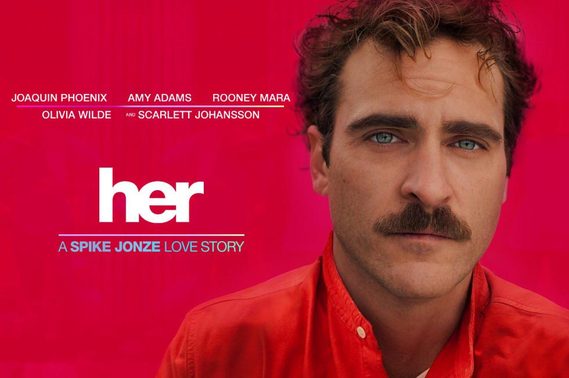Her succeeds in a dozen little moments, opting for silent charm over visual indulgence. On the brink of divorce, Phoenix’s Theodore does not whine or yell or complain bitterly with coworkers. Instead, he stares out of the subway window, or lies silently awake, the sadness made suffocating in his vacant, pale green eyes. When Theodore daydreams about his past life, we see snatches of memories, unexpected, brief, and gone as quickly as they arrived. Delicately drawn, director Spike Jonze’s flashbacks capture an indescribable essence of human recollection. In Her, memories are like fragments of glass: fragile, sharp, and broken.
A less confident film might have lingered on Theodore’s depression, harping on setbacks and demanding the audience's pity. Instead, Her moves along with a satisfying swiftness, content to play each emotional note well, but never more than once or twice. Theodore’s despondency soon collides with Samantha (voiced by Scarlett Johansson), the alluring, artificially-intelligent operating system designed to meet all of Theodore’s needs. Johansson’s voice is everything but robotic: it carries a delightful mix of girlish playfulness, husky sass, and even—forgive me—some sexiness. The film's premise might make you squirm, but Johansson’s sultry wordplay will win over sci-fi geeks and grumpy realists alike.
It’s tough to say whose performance is more impressive. On the one hand, Mr. Phoenix carries the entire film on his droopy, damaged shoulders, giggling at Samantha’s commentary one moment, then lost in his sad memories the next. It’s an unconventional, unpredictable performance, but it never rings false. On the other hand, Johansson achieves a rare range of tone, her voice fluid, then halting, then worried, then alive with joy. She may be known for her curvy physique, but her body-less role transcends even her most accomplished work—it’s her best performance to date.
If there’s one thing that might polarize viewers, it’s the dialogue. Much like (500) Days of Summer, Her is filled with verbal nuggets that will enchant some and exasperate others. “The past is just a story we tell ourselves,” observes Samantha, describing how humans tend to string together offhand, insignificant comments to write larger narratives about their lives, successes, and failures. “Love is a form of socially acceptable insanity,” says Amy (Amy Adams), when she decides that falling in love with a virtual person is hardly crazier than falling in love with anyone at all. Granted, I did cringe once or twice—when a movie tosses up twenty philosophical declarations, a few are bound to land with a thud. But for me, almost all of the dialogue works. Her never tells you what to believe: it only asks that you think, consider, and listen.
It may be that Her caught me at the right time in life: a film about twenty- and thirty-somethings living alone and looking for connection through (and with) their technology. Or perhaps it was the film’s intimate cast and minimalist sensibilities that charmed me. Most of all, however, I will remember Her--amidst all the boat parties, space stations, and magical creatures—for its willingness to speak with a soft, confident intimacy. When everyone is shouting, it's often best to whisper.


 RSS Feed
RSS Feed
